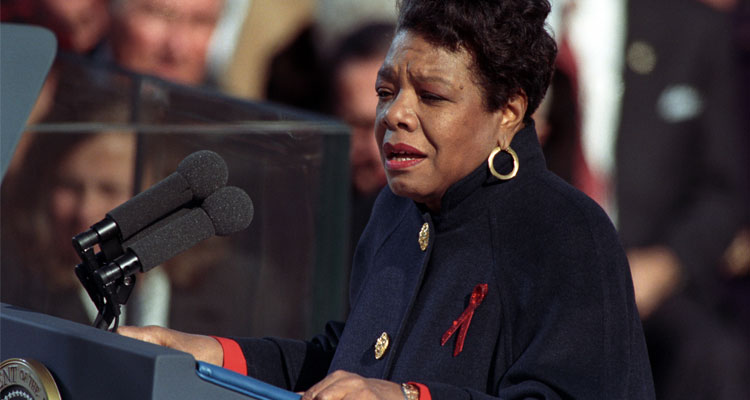Despite her extraordinary gift of language, poet and author Maya Angelou did not speak for five years when she was a child. Her self-enforced silence began after a traumatic incident caused her to believe her words had terrible consequences. At just eight years old, she was raped by her mother’s boyfriend. When she revealed the truth and identified the rapist, he was later found beaten to death. “I thought, my voice killed him,” she wrote in her first autobiography, I Know Why the Caged Bird Sings, “I killed that man, because I told his name. And then I thought I would never speak again, because my voice would kill anyone.” So she simply stopped speaking.
Her family also chose to never speak of the incident again, so Angelou did not receive the support and counseling she needed during those five years she remained mute. Shortly thereafter, she and her brother were sent back to live with their grandmother. “For nearly a year, I sopped around the house, the store, the school, and the church,” she writes in the 1969 memoir, “like an old biscuit, dirty and inedible.” She was depressed and withdrawn, but she remained an avid reader who loved literature thanks to her visits to the local library.
A Teacher’s Intervention
Although Angelou was close to her brother and had an extended family that included her mother, grandmother, and uncles, it was a local teacher, Bertha Flowers, who helped her regain her voice. Flowers left a profound impression on young Maya, who was charmed by the teacher’s style and unusually refined grace. “I don’t think I ever saw Mrs. Flowers laugh, but she smiled often,” Angelou wrote. “When she chose to smile on me, I always wanted to thank her.”
So when Flowers spoke, Maya listened. In her autobiography, Angelou vividly recalls what Flowers said to her. “Your grandmother says you read a lot. Every chance you get,” she told young Maya. “That’s good, but not good enough. Words mean more than what is set down on paper. It takes the human voice to infuse them with the shades of deeper meaning.” Her words struck Angelou as poetic and their relationship grew as Flowers provided Maya with new books and heightened motivation to read.
Eventually, this patient teacher broke through Maya’s long silence by challenging her to read poetry aloud. As Angelou recalled in a 1986 interview with NPR, Flowers challenged Angelou’s appreciation for poetry saying, “You do not love poetry, not until you speak it.” For a time, young Maya rejected the teacher’s assertion, but ultimately she uttered the words from a book of poetry and heard the poems come alive from her own lips. So at age 13, she gradually began speaking again.
Through Flowers’ individual attention, Angelou learned many life lessons growing up in the rural town of Stamps, Arkansas. According to Angelou, Flowers told her to be “intolerant of ignorance but understanding of illiteracy.” And she explained that “language is man’s way of communicating with his fellow man, and it is language alone which separates him from the lower animals.”
Bertha Flowers is a dramatic example of the impact a teacher can make on a young student. Her wisdom, and especially the extra attention she gave this neglected little girl, influenced Angelou for years to come. “I was liked, and what a difference it made,” Angelou wrote. “I was respected not as Mrs. Henderson’s grandchild or Bailey’s sister but for just being Marguerite Johnson.” (Marguerite Johnson was Angelou’s given name.)
The Student Becomes a Teacher
Though she is best known as a poet, author, speaker, and civil rights activist, Angelou was also an influential teacher herself. She taught poetry and humanities courses for many years at Wake Forest University. As a professor, she made an effort to fully engage her students. “I will use any ploy to convey my message,” she is quoted saying about her teaching style. “I will sing. I will read Shakespeare.”
In fact, she came to see teaching as her true vocation. “I found after teaching one year that I had misunderstood my calling,” she wrote in a 2013 article for The Guardian. “I had thought that I was a writer who could teach. I found to my surprise that I was actually a teacher who could write.”
Bertha Flowers’ encouragement, as well as the support of her other teachers over the years, continued to have an impact on Angelou throughout her life. In 2013, Maya Angelou spoke to a gathering of educators at the Association for Supervision and Curriculum Development (ASCD) Annual Conference. Comparing teachers to rainbows in the clouds she told them, “You have enhanced the possibility of seeing light and opportunity in the lives of so many. I thank you for that.”
Even when she was a wordless little girl, Angelou said her grandmother, Annie Henderson, could see that she had potential beyond her circumstances. Angelou told Smithsonian Magazine in 2003 that her grandmother, whom she called Momma, actually predicted that she would be a teacher. “She said, ‘Sister, Momma don’t care what these people say, that you must be an idiot, a moron, ’cause you can’t talk. Momma don’t care. Momma know that when you and the good Lord get ready, you gon’ be a teacher,’” Angelou recalled.
Maya Angelou’s story is an inspiring example of the important role that teachers play in their students’ lives. And it is also a reminder of how much children can accomplish when they receive encouragement along the way.
As Angelou once said, “At our best, we are all teachers.”





































